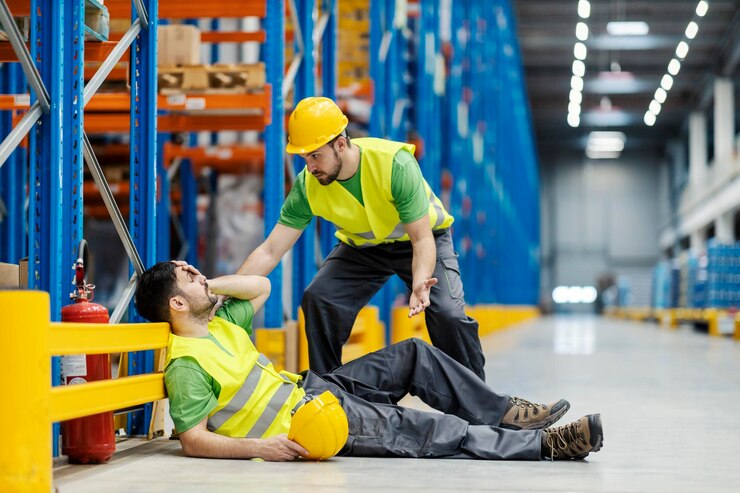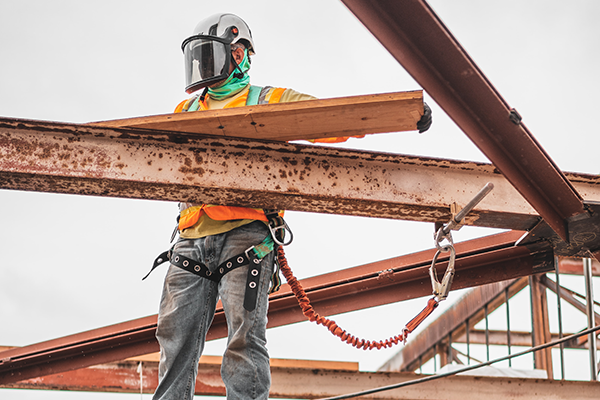Factory Accident Claims
NoWinNoFee.com is a claims management company that helps people claim compensation for an accident or injury that wasn't their fault
With no win no fee agreements (also known as a Conditional Fee Arrangements, or CFAs), there are no upfront legal fees, which means anyone who has been involved in an accident that wasn’t their fault can gain access to justice without any financial risk. Your solicitor only gets a fee if your claim is successful. If your claim isn't successful, you won’t pay your solicitor any legal fees.
If your case is successful, typically you will pay 25% (including VAT) of your compensation to your solicitor, although they will discuss any fees before starting your case. To ensure your claim is risk free, your solicitor may take out an insurance policy on your behalf. If you terminate the agreement, you may have to pay fees for the time already spent on your claim, or due to: lack of cooperation, misleading your solicitor, missing medical or expert examinations, or not attending court hearings.
There are some instances where you are not required to use the services of a claims management company, and are able to claim yourself, for free, directly via the relevant ombudsman/compensation scheme. These include:
- Criminal injuries: The Criminal Injury Compensation Authority (England, Wales, and Scotland) or the Criminal Injury Compensation Scheme (Northern Ireland)
- Minor road accidents: The Official Injury Claim Portal
- Accidents involving uninsured drivers: The Motor Insurers' Bureau
Factory Accident Claims
Call now on 0800 234 6438
Employers are required by law to put measures in place that protect employees and prevent incidents from occurring. If your employer fails to follow health and safety procedures, you have every right to make a compensation claim.
Making a compensation claim can relieve financial pressure and help you hold factory owners accountable. If you’d like to discuss your eligibility and get free legal advice, call 0800 234 6438 or fill in the online form, and a specialist advisor will get back to you.
What is a factory accident?
Factory accidents can be anything from minor cuts and bruises to long-term or fatal conditions.
According to the DWF Group, there were 123 work-related fatalities between 2021 and 2022. Of those fatalities, the most common causes were falls from a height and being struck by moving or falling objects.
The report also shows that the manufacturing industry has the second-highest fatality rate among employees, with only agriculture surpassing it.
Because of the potential threats that arise from working in a factory environment, employers have a duty of care to each employee, which includes maintaining equipment, ensuring employees receive proper training and promoting health and safety in the workplace.
Failing to follow legislation from the Health and Safety Executive (HSE) and the Health and Safety Act (1974) can result in serious accidents, illnesses and even fatalities.
Why make a factory accident compensation claim?
Whether your injury is minor or more serious, manufacturing companies have a duty of care to each employee and visitor. Failing to take proper health and safety measures can lead to severe accidents, and you have a right to claim compensation.
The money you receive will provide financial support and cover any private medical treatments. However, holding your employer responsible also means you might prevent incidents from occurring again, as they’ll put stronger health and safety procedures in place.
The causes of factory accidents
Factory accidents can occur due to improper training, poor maintenance of machines and general human error. As the manufacturing industry uses a lot of machinery and often requires heavy lifting, it’s common for numerous injuries to occur.
The following are the most common causes of accidents in factory settings:
- Poor Training: Employees who don’t receive proper training are more at risk of accidents because they work in a busy environment and handle machinery. Businesses that don’t focus on providing inductions and ongoing training are more likely to deal with incidents.
- Slips & Falls: Many people experience slips and falls due to obstructions or slipping on liquids. Employers must place clear signs for employees and visitors that list potential hazards and prevent accidents.
- Faulty Equipment: The manufacturing industry is heavily reliant on machinery, and ongoing care and maintenance are essential to health and safety. Faulty machines are a significant contributor towards accidents despite being highly avoidable.
- Long-Term Illnesses: If you work with chemicals regularly or deal with a long-term disability that results from noise exposure or asbestos-related illnesses.
- No PPE: Personal Protective Equipment is vital for numerous work environments, and employers must supply their teams with effective equipment. Injuries can occur if your PPE doesn’t function properly or you’re not provided with any.
Common injuries sustained from factory accidents
The injuries you might sustain from a manufacturing accident can be minor, including cuts and lacerations or long-term conditions that require ongoing treatment. In the worst cases, fatalities can occur, which has a devastating impact on family members.
Potential injuries include:
- Fractures and dislocations
- Crushing injuries
- Loss of limbs
- Repetitive stress injuries
- Post Traumatic Stress Disorder
- Paralysis
- Traumatic Brain Injuries
- Fatalities
These injuries require some care, and many mean an individual cannot work or perform daily activities.
Claiming compensation for a factory accident
If you want to claim compensation for a factory-related injury, the first step is to explore whether you’re eligible. In some cases, it can be hard to prove negligence, as you’ll need to show that the employer:
- Breached their duty of care.
- Caused an accident or injury.
- Is responsible for the incident.
To help determine your eligibility, call 0800 234 6438 or use the online form and seek free legal advice. You’ll speak with a trained legal advisor who will ask questions about the incident and determine whether your claim will be successful. If they believe you could have a claim, they’ll pass your details on to a no win no fee legal service.
Claiming on a no win no fee basis
Making a compensation claim with personal injury solicitors has lower risks than a traditional solicitor, as you don’t pay any upfront fees. Instead, your lawyer will take their costs out of your compensation and receive nothing unless they win your case.
Calculating your claim
A significant part of the claims process is calculating the compensation you should receive. Your personal injury lawyer will look at your case and factor in the degree of negligence. Evidence is essential for the claim to be successful, which your lawyer will gather.
You might need to attend a medical assessment to prove your injuries, and the solicitor will also look at other evidence, including the degree of negligence, to determine how much compensation you should receive.
Negotiating a settlement
Your lawyer will then meet with the negligent party’s insurance company to discuss your injuries and begin negotiations. The insurance provider may want you to attend a medical assessment so they can see how any injuries sustained impact your life and ability to work.
Some compensation claims settle relatively quickly, while others can be drawn out—especially when neither party can reach an agreement.
However, your solicitor will keep you informed throughout the process and discuss the possibility of going to court if that’s the best way to secure compensation.
Settling the claim
Once both parties agree on a figure for your accident claim, your lawyer will take their fee out of your compensation, and you’ll receive the rest of the money. You’ll usually receive an outright payment, but some people get regular payments throughout their lives.
How much compensation can I claim?
The compensation you receive depends on numerous factors, and there are no set amounts. Your no win no fee solicitor will be able to give you an idea of the potential amount you’ll receive, but it also depends on the negligent party’s insurance provider and whether they’re willing to settle the claim.
When calculating your compensation, the solicitor will consider both general and special damages.
General damages
The injuries caused due to a workplace accident and any pain or suffering they cause count as general damages. For example, an individual with a fractured bone will experience pain, but crushing injuries from factory machinery accidents result in more compensation.
Special damages
Any financial losses, care costs and travel expenses fall under the special damages umbrella. For example, if your factory injuries prevent you from working and you have to rely on credit cards, this amount can be added to your claim.
The best way to get an idea of what you can claim is by using a free calculator or speaking to a legal advisor for free.
Should I gather evidence to prove my employer’s negligence?
It’s always a good idea to gather any evidence you can after the accident happened, as it can speed up your claim and help prove negligence. There are steps you can take to provide your solicitor with evidence, including:
-
Taking photographs of where and when the incident occurred.
-
Ask witnesses – including other factory workers- for their contact information.
-
Review the policies in place and any risk assessments to see whether your employer did anything to promote health and safety.
-
Go to your GP or hospital and receive treatment for your injuries.
-
Try to obtain any CCTV footage if possible. Your solicitor can also help you with this.
-
Keep a record of any costs, such as travel and healthcare.
Get the ball rolling on your factory injury claim today
Compensation can help you recover from injuries and look forward to a brighter future. If you’re keen to find out more about making a claim, the first step is to call 0800 234 6438 or fill in the online form to get free advice from a legal advisor.
How long do I have to make a claim?
As with all personal injury claims, you have up to three years after the initial factory accident. However, it’s best to claim quickly as the process might be drawn out and doing so ensures you have enough time to settle the claim.
Will I lose my job if I make a claim?
No, there are laws in place that prevent this from happening. If you’re injured in a factory accident, you have the right to claim, and your employer’s liability insurance should cover the costs.
Many people worry about upsetting their employer, but they have a duty of care to their workforce, and compensation can give you some much-needed financial support.
Can I claim on behalf of a loved one?
Individuals who lose their spouses can make factory accident compensation claims to cover any financial losses. If you’re unsure of your eligibility, the best thing to do is contact a legal advisory service to discuss any personal circumstances.
How long does the compensation claims process last?
Unfortunately, there are no set time limits as it depends on how both parties negotiate the case. Naturally, your lawyer will want to secure compensation as soon as possible, but personal injury claims can sometimes go to court if neither side reaches an agreement.




